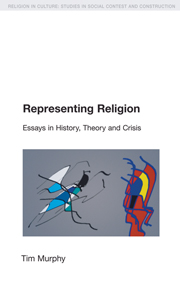Book contents
- Frontmatter
- Dedication
- Contents
- Acknowledgements
- Chapter 1 The “Crisis of Representation” and the Academic Study of Religion
- Part I Phenomenology, Consciousness, Essence: Critical Surveys of the History of the Study of Religion
- Part II Towards a Nietzschean Semiotics of Religion
- Chapter 6 (Post)Structural (Dis)Placements: Genealogy, Religious Studies, and the Problematics of Historical Identity
- Chapter 7 “Religion” as the Structuring of Asymmetrical Relations: Towards a Definition
- Chapter 8 Towards a Semiotic Theory of Religion
- Notes
- Bibliography
- Index of Subjects
- Index of Names
Chapter 8 - Towards a Semiotic Theory of Religion
from Part II - Towards a Nietzschean Semiotics of Religion
- Frontmatter
- Dedication
- Contents
- Acknowledgements
- Chapter 1 The “Crisis of Representation” and the Academic Study of Religion
- Part I Phenomenology, Consciousness, Essence: Critical Surveys of the History of the Study of Religion
- Part II Towards a Nietzschean Semiotics of Religion
- Chapter 6 (Post)Structural (Dis)Placements: Genealogy, Religious Studies, and the Problematics of Historical Identity
- Chapter 7 “Religion” as the Structuring of Asymmetrical Relations: Towards a Definition
- Chapter 8 Towards a Semiotic Theory of Religion
- Notes
- Bibliography
- Index of Subjects
- Index of Names
Summary
From where do religions come? From other religions. A “new” religion is a permutation—not infrequently in the form of a reversal, total or partial, of a previously existing religion. Where Brahmanic Hinduism posited the transmigration of the atman, Buddhism posited the doctrine of anatman. Where Judaism posited Torah or Law, Paulinian Christianity posited grace. Where New England Puritans saw themselves as the children of Abraham, the Israelites, England as “Egypt,” and America as Canaan, African-American slaves saw Anglo-Protestants as “Pharaoh,” America as Egypt, i.e., “the house of bondage,” themselves as the Israelites, and freedom from slavery (in whatever form), as Canaan. Permutation, reinterpretation, recontextualization, re-emplotment, reversal: the “history of religion” is the history of the deployment of such tropes.
By way of analogy, the science of religion must carefully consider the explanation of this species of activity offered by Tzevtan Todorov, who describes how these kinds of processes work in literature and in language:
Where do genres come from? Quite simply from other genres. A new genre is always the transformation of an earlier one, or of several: by inversion, by displacement, by combination … There has never been a literature without genres; it is a system in constant transformation, and historically speaking the question of origins cannot be separated from the terrain of the genres themselves. Saussure noted that “the problem of the origin of language is not a different problem from that of its transformation.”
- Type
- Chapter
- Information
- Representing ReligionEssays in History, Theory and Crisis, pp. 156 - 168Publisher: Acumen PublishingPrint publication year: 2007

